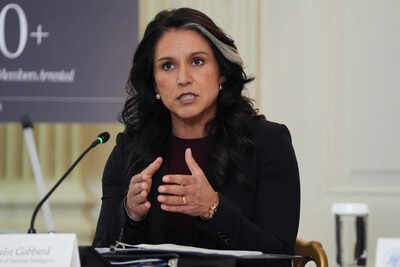The USA’s Director of National Intelligence Tulsi Gabbard says Islamist terrorism remains the most serious threat facing the United States today. In an interview with ABC, published on 15 November 2025, she warned that the threat has evolved from large, organised groups abroad to include lone-wolf attackers radicalised online. She said the lessons she learned after 9/11 still shape her approach to national security.
Tulsi Gabbard highlights shift from organised networks to lone-wolf attackers
Gabbard said the US intelligence community now faces a more diffuse threat landscape. Instead of structured terrorist organisations directing operations from overseas, individuals radicalised online or inspired remotely present growing risks. She said ODNI, together with federal and local partners, has disrupted several lone-wolf plots, but identifying such actors is becoming increasingly difficult.She also expressed concern about individuals who may have entered the United States in recent years with suspected ties to extremist groups, warning that ideological threats are now as significant as operational ones. Online propaganda from groups like al-Qaeda, she said, is spreading more rapidly and reaching far beyond traditional conflict zones.
A career shaped by 9/11 and military service
Gabbard, a lieutenant colonel in the Army Reserve, is the first person to serve as DNI while still in military uniform. She said the 9/11 attacks motivated her to enlist, and her deployments, including surviving frequent mortar attacks at Camp Anaconda in Iraq, have defined her understanding of terrorism and her sense of duty. She has described Islamist terrorism as the primary long-term challenge to American freedom and Western civilisation.In 2021, Gabbard deployed to the Horn of Africa, where she worked with Somali forces and regional partners to counter al-Shabaab, a key al-Qaeda affiliate and major financial supporter of the network. These experiences reinforced her belief that extremist threats persist even as their form continues to change.As a Democratic congresswoman and former DNC vice chair, Gabbard frequently broke with her party on counterterrorism policy. She publicly criticised the Obama administration for avoiding the term “Islamist extremism”, drawing praise from some Republican lawmakers and pushback from Democratic leaders. She argues that political caution around language has hindered honest assessments of extremist threats.Her positions have at times led to accusations of Islamophobia, which she rejects, saying that refusing to acknowledge the ideological component of extremist violence “comes at the cost of our own security”.
A worldview grounded in faith and experience
Gabbard has spoken about the personal toll of service, including the psychological strain of deployments that prematurely turned her hair white. She has kept a white streak as a reminder of the human cost of conflict. Daily reminders of mortality, such as a sign at Camp Anaconda reading “IS TODAY THE DAY?”, shaped her outlook on service and leadership.She said her faith, including readings from both the Bible and the Bhagavad Gita, helped her navigate the pressures of war and continues to guide her approach to national responsibility.
Agency reforms and national security priorities
As DNI, Gabbard has proposed significant reforms to reorganise her agency and cut its staffing by half, a move that has drawn criticism from some lawmakers who fear it could weaken intelligence capabilities. Her allies say the plan reflects her belief that the agency must be streamlined to respond effectively to modern threats.Gabbard also said the intelligence community has shifted additional attention to issues in the Western Hemisphere, including drug cartels and human trafficking networks, but maintained that Islamist terrorism remains the most sustained and dangerous threat.
Facing a changing threat landscape
Gabbard’s warnings align with broader intelligence community concerns about decentralised, individually inspired extremism. She has called for renewed focus and resources to address this evolving threat while balancing civil liberties and constitutional protections.While the nature of terrorism continues to shift, Gabbard said her mission remains rooted in the commitment she made after 9/11: to serve, protect and confront threats to the country. “The threat has changed form,” she said, “but the mission to defend the nation stays the same.” Go to Source




